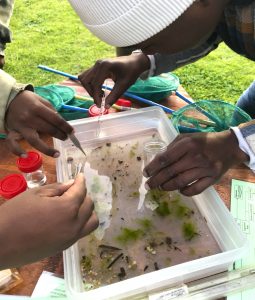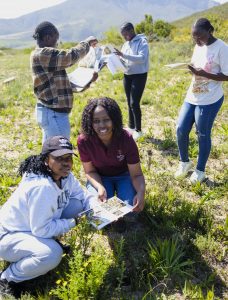A group of 27 learners from the Luhlaza Secondary School recently participated in an educational workshop presented by Iimbovane in Stellenbosch. The workshop, which took place from 13 to 14 September 2024, focused on environmental studies and was filled with activities designed to explore local biodiversity.
The camp started off with the learners participating in the sampling and identification of invertebrate species found in a river within the unique Fynbos ecosystem. During this investigation, they measured various abiotic components (e.g. water temperature, turbidity) and examined the biotic components (e.g. algae, invertebrates, macrophytes). This helped the learners to understand the delicate balance between the abiotic and biotic components in an ecosystem. As part of this study, the learners were also introduced to the concept of Functional Feeding Groups (FFG).
In a separate study, the learners shifted their focus to plant ecology by conducting a survey to assess the impact of pine trees on the diversity of indigenous plant species. The findings highlighted a contrast: areas of Fynbos untouched by invasive pines exhibited a high level of biodiversity. These uninvaded areas burst into life after the winter rains with numerous species flowering. Among the notable floral finds were fields of purple Babiana or Bobbejaantjies, the speckled Lachenalia orchioides, the orange and yellow Gladiolus alatus or Kalkoentjie, and the delicate heath, Erica totta.
Each field investigation concluded with a data analysis session, where learners presented their findings and shared their experience of learning while working in the field. These discussions allowed them to not only share the scientific outcomes but also to express the skills they gained through working directly in nature.
The workshop was also attended by two students currently completing their Post Graduate Certificate in Education at Stellenbosch University. Serving as facilitators during the workshop, they guided the learners through the various field studies and provided support and expertise throughout the activities.
“The camp was an enriching experience that deepened my understanding of environmental education. As a future Life Sciences educator, I realised the importance of providing leaners with a hands-on learning experience as it will help them understand the subject matter,” says Martha Chimola.
Another student, Dakalo Davhana, adds:
“I had a great time at the Iimbovane workshop and acquired valuable skills for my future as a Life Science educator. During the workshop, I gained valuable experience in group management and hands-on learning by working with high school students. This experience has equipped me to actively interact with students as a Life Science teacher in the classroom.”
|
|
|

